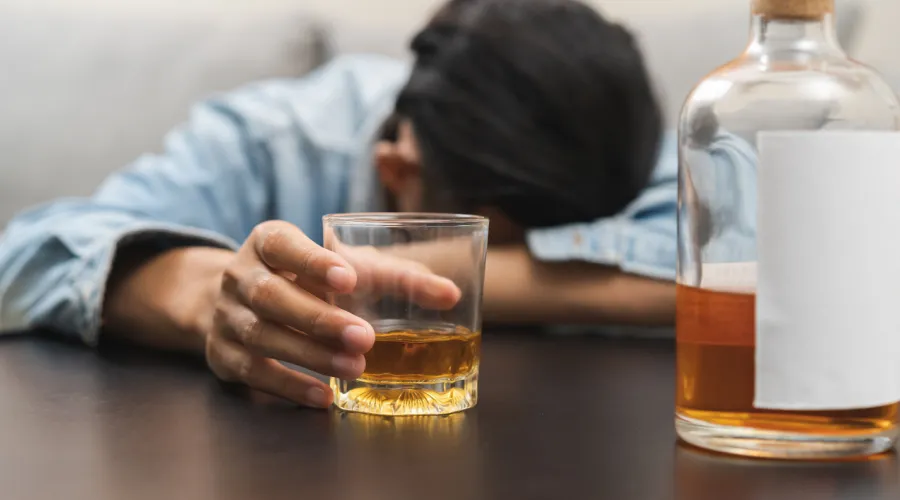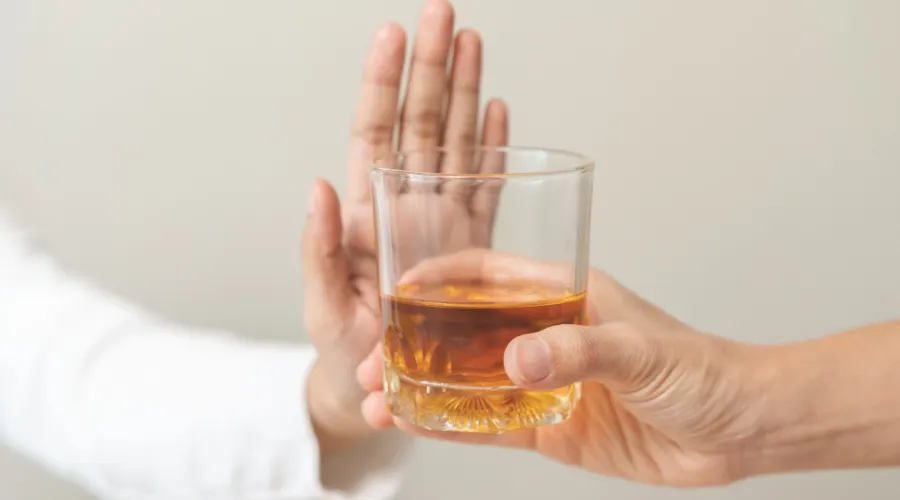How Fame and Addiction Can Go Hand-In-Hand
Alcohol addiction doesn’t discriminate, as demonstrated by many famous alcoholic couples. It touches lives across every social class, culture, and occupation—including the glamorous world of celebrity. Some celebrities were born into environments that influenced their struggles with addiction, facing early life experiences and the pressures of fame that contributed to their battles with alcohol and drug abuse.
When two people in a romantic relationship struggle with substance use, the challenges can be amplified. The highs and lows of fame, coupled with the intensity of addiction, have played out publicly in some of Hollywood’s most talked-about relationships.
In this post, we’ll explore several famous alcoholic couples, the impact of drug and alcohol addiction on their relationships, and what we can learn about love, codependency, and recovery.
The Intersection of Love and Addiction

Relationships are complex on their own. Add in addiction, and they can quickly become emotionally volatile and destructive. Child actresses, like Lindsay Lohan, often face unique challenges, including struggles with substance misuse, which can impact their personal lives and relationships.
For couples who both struggle with alcohol use disorder (AUD), there can be an almost magnetic pull—rooted in shared trauma, enabling behaviors, and a mutual understanding of pain. But there’s also potential for deep empathy and healing—especially when recovery becomes part of the story.
In the case of celebrities, these dynamics often play out on a world stage, for better or worse. Let’s take a look at some of the most famous couples who battled substance and alcohol abuse together.
Richard Burton and Elizabeth Taylor
When you think of legendary Hollywood romances, Elizabeth Taylor and Richard Burton often top the list. Their love story was dramatic, intense, and deeply intertwined with bad drinking habits. Married twice, their relationship was as fiery as it was destructive.
Both struggled with alcoholism during their relationship, often drinking heavily together between movie shoots. Elizabeth Taylor’s drinking affected her ability to read her lines on set, highlighting the devastating effects of addiction on her professional life.
Burton once remarked that he needed a bottle of vodka just to get through the day, and Taylor’s drinking was equally problematic—leading to multiple stints in rehab later in life. Despite their undeniable chemistry and shared artistic brilliance, alcohol created a toxic dynamic.
They fought often, sometimes violently, and their love couldn’t outlast the damage done. Their story is a prime example of how substance use can bond people emotionally while simultaneously eroding the foundation of a relationship.
Anthony Bourdain and Ottavia Busia

Celebrity chef and world traveler Anthony Bourdain was candid about his struggles with addiction, particularly heroin and alcohol in his early years. Addiction treatment can be incredibly costly, with facilities like the one Colin Farrell attended costing $36,000 per month.
Though he cleaned up before becoming a household name, alcohol remained a presence in his life—one he managed with a level of control that may have masked ongoing struggles. His marriage to Ottavia Busia, a mixed martial artist, was filled with the chaos of fame and frequent travel.
Though Ottavia was not publicly known to struggle with addiction herself, Bourdain’s lifestyle and internal battles eventually led to emotional distance and a quiet separation. His tragic death in 2018 revealed the ongoing complexities of mental health and substance use—even among those who seem to “have it all.” Their story highlights how addiction doesn’t just affect those actively using—it shapes the emotional landscape of relationships and leaves lasting impacts.
Whitney Houston and Bobby Brown: A Tragic Tale of Codependency
Few couples have been as infamously tied to substance use as Whitney Houston and Bobby Brown. Once hailed as pop royalty, their relationship devolved into a chaotic union fueled by drugs and alcohol. While Houston was already an icon before their marriage, many fans and media outlets blamed Brown for introducing her to a more dangerous lifestyle. However, both partners struggled with addiction long before or independently of their relationship.
Their marriage was marred by public outbursts, legal issues, and tabloid headlines. Behind closed doors, the couple enabled each other’s substance use, creating a toxic environment of codependency. Despite efforts to seek treatment—both individually and together—addiction ultimately took a heavy toll. Houston’s death in 2012 was ruled as an accidental drowning, with cocaine and heart disease listed as contributing factors.
Bobby Brown has since spoken publicly about his sobriety and the pain of losing Whitney and their daughter, Bobbi Kristina. Their story is a devastating reminder of the lethal consequences addiction can have—not just on individuals, but on families. In fact, their lives and relationships were profoundly affected by their struggles with addiction.
Johnny Cash and June Carter: Redemption Through Love and Sobriety
Not every story involving addiction ends in heartbreak. Johnny Cash and June Carter are often celebrated as a couple who overcame personal demons through love and mutual support. Cash’s early career was marked by heavy alcohol and amphetamine use, which took a toll on his health and relationships.
His erratic behavior led to arrests and public scandals, but it was June Carter—his musical partner and eventual wife—who stood by him and encouraged his journey toward recovery. Similarly, Johnny Depp has described how writing on the page helped him cope with his personal struggles, highlighting the emotional weight of his writing process during a tumultuous time in his life.
With June’s support, Cash entered rehab, got sober, and experienced a personal and professional resurgence. Their relationship became a symbol of resilience and redemption, showing that recovery is possible—even for those who’ve hit rock bottom.
June reportedly made sobriety a condition for their marriage, and Cash often credited her love and strength for saving his life. Their partnership shows the power of healthy support in recovery—when it’s rooted in boundaries, honesty, and mutual commitment.
Angelina Jolie and Brad Pitt: Struggles in the Reality Spotlight

When Brad Pitt and Angelina Jolie got together, they were seen as Hollywood’s ultimate power couple. But behind the glamour, Pitt was grappling with alcoholism—a struggle he admitted publicly after their separation. In interviews, he’s spoken about using alcohol to cope with stress and emotional numbness, especially during the later years of their marriage.
Jolie reportedly encouraged him to seek help, and following their divorce, Pitt got sober and started attending therapy and recovery meetings. While Jolie has not publicly identified as someone with alcohol use issues, she has acknowledged growing up around addiction and its emotional toll.
Their story sheds light on how substance use can quietly erode even the most seemingly perfect relationships—and how recovery can begin even after the love story ends. Brad Pitt’s journey illustrates that recovery from alcoholism is not only possible but also a tangible reality.
Ozzy and Sharon Osbourne: Chaos, Commitment, and Sobriety
The Osbournes have never been shy about their struggles. Ozzy Osbourne, the “Prince of Darkness,” has battled alcohol and drug addiction for decades, and his wife Sharon has been his fiercest advocate—and, at times, his harshest critic. Their marriage has seen it all: relapses, infidelity, violence, and mental health crises. Yet, they’ve remained together through thick and thin.
Sharon has spoken openly about the challenges of being in a relationship with someone who has relapsed multiple times. Despite everything, they’ve both worked toward stability—Ozzy through multiple stints in rehab and Sharon through therapy and support networks. While their relationship has been far from perfect, it illustrates the long and often painful road of loving someone with an addiction, and the importance of boundaries, accountability, and treatment.
The Impact of Addiction on Mental Health

Addiction doesn’t just ravage the body; it takes a profound toll on mental health, leading to a cascade of emotional and psychological challenges. Substance abuse can exacerbate existing mental health conditions like depression and anxiety, creating a vicious cycle that’s hard to break. For many, the stress and trauma associated with addiction can lead to the development of new mental health issues, including post-traumatic stress disorder (PTSD).
The emotional rollercoaster of addiction often leads to feelings of guilt, shame, and worthlessness. The loss of control and the powerlessness that come with addiction can plunge individuals into deep despair and hopelessness. Addressing these mental health aspects is crucial for a comprehensive and effective recovery. Without tackling the psychological roots and consequences of addiction, true healing remains elusive.
Addiction Treatment and Recovery
Overcoming addiction requires a holistic approach that addresses the physical, emotional, and psychological facets of the problem. A well-rounded treatment plan typically includes a combination of medication, therapy, and support groups, each playing a vital role in the recovery journey.
Medications can help manage withdrawal symptoms, reduce cravings, and prevent relapse, providing a crucial foundation for recovery. Therapy, such as cognitive-behavioral therapy (CBT) and motivational interviewing (MI), helps individuals identify and change the negative thought patterns and behaviors that fuel addiction. Support groups like Alcoholics Anonymous (AA) and Narcotics Anonymous (NA) offer a sense of community and accountability, which are essential for long-term sobriety.
Recovery is a lifelong process that demands ongoing effort and commitment. Continuing therapy sessions, attending support groups, and participating in aftercare programs are vital steps to maintain sobriety and prevent relapse. It’s a journey that requires perseverance, but with the right support, it is entirely achievable.
The Psychology of Addicted Relationships

It’s important to understand why some couples with addiction histories seem drawn to one another. Shared experiences, trauma bonds, and emotional familiarity often play a role. These relationships can sometimes take on a codependent dynamic, where one partner enables the other’s use, or where both rely on substances to cope with relationship stressors.
But there’s also potential for transformation. When both partners are committed to getting sober, the relationship can become a powerful source of mutual healing. However, successful recovery requires that each individual takes personal responsibility, seeks professional help, and sets healthy boundaries. Recovery is deeply personal, and love—while important—is not a replacement for professional treatment.
The Importance of Support and Community
Support and community are the bedrock of successful addiction recovery. A strong support system can provide the motivation and accountability needed to navigate the challenging path to sobriety. Support groups like AA and NA offer a sense of belonging and connection with others who understand the struggles of addiction firsthand.
Family and friends also play a crucial role in supporting recovery. By educating themselves about addiction and recovery, loved ones can better understand the challenges involved and provide meaningful support. Emotional encouragement, accountability, and a non-judgmental attitude can make a significant difference in an individual’s recovery journey.
In today’s digital age, online communities and forums offer additional layers of support. For those who may not have access to in-person groups, these online resources provide valuable information, connection, and encouragement. Addiction blogs and recovery websites can be powerful tools for those seeking guidance and support in their recovery journey.
Can Couples Recover Together in Addiction Recovery?

Yes, but it’s complicated. Reading about famous alcoholics and the lessons learned from their experiences can provide valuable insights and motivation. Couples therapy, programs like Recovering Couples Anonymous, individual counseling, and participation in recovery programs like Alcoholics Anonymous (AA) or SMART Recovery can help.
Some couples benefit from attending rehab together, though this approach isn’t suitable for everyone. In many cases, one partner may need to seek treatment first before the relationship can be addressed. Trust must be rebuilt, communication re-learned, and new coping mechanisms developed.
The couples who succeed in recovery often have a few things in common: honesty, accountability, external support systems, and a shared vision for the future. The journey isn’t easy—but it is possible.
Lessons We Can Learn from Famous Couples with Alcohol and Drug Addiction
So, what do these stories teach us? First, addiction affects everyone differently, but the relational impacts are often profound. Whether a couple stays together or not, the presence of addiction fundamentally changes how people relate to one another.
Artists like Demi Lovato and Amy Winehouse, known for their powerful voices, show how exceptional singing abilities contributed to their fame, yet they still faced significant personal battles. Second, love alone isn’t enough to conquer addiction. While love can be a motivating factor, recovery requires structure, support, and self-work.
Third, public perception often oversimplifies addiction stories. We might blame one partner, label one as the “bad influence,” or assume wealth and fame offer immunity. But addiction is complex, and recovery is not a straight path. The most important takeaway? There’s no shame in struggling—and no weakness in asking for help.
Breaking the Cycle of Addiction

Breaking the cycle of addiction requires a comprehensive approach that addresses its physical, emotional, and psychological dimensions. Identifying and addressing the underlying causes of addiction—such as trauma, stress, and mental health issues—is essential. Therapy and support groups can provide the tools and support needed to tackle these root causes.
Developing healthy coping strategies is another crucial step. Activities like exercise, meditation, and creative pursuits can help individuals manage stress and emotions without resorting to substances. Building a robust support system, including family, friends, and support groups, provides a sense of community and accountability that is vital for sustained recovery.
Environmental factors also play a significant role in addiction. Social pressures and easy access to substances can be significant hurdles. Educating oneself about addiction and recovery can empower individuals to make informed decisions about their health and well-being.
By addressing the multifaceted nature of addiction, individuals can break free from its grip and achieve long-term recovery. It’s a challenging journey, but with the right support and strategies, it is entirely possible to reclaim one’s life from addiction.
Finding Hope Beyond the Headlines
Famous alcoholic couples show us both the devastating impact of substance use and the incredible resilience of the human spirit. While some relationships end in tragedy, others evolve into stories of redemption and growth. Regardless of the outcome, each story reveals the urgent need for compassion, awareness, and access to treatment.
If you or someone you love is struggling with alcohol addiction, know that help is available. Whether you’re trying to support a partner, or you’re seeking recovery yourself, you’re not alone. Healing is possible—with or without a relationship in the picture.
If you and your partner are ready to achieve a sober life, Couples Rehab Guide is here to help. We can help you find a treatment center that caters to each of your and your partner’s needs and will get you on the path to a happier, healthier life and relationship.


